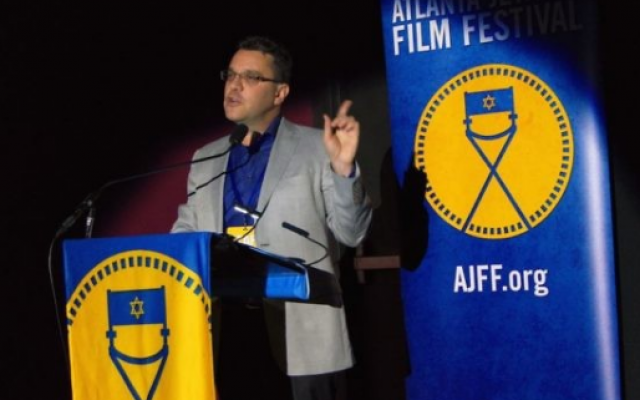Kenny Blank’s Steady Hand Still Guides the AJFF
Kenny Blank’s vision as the executive director has helped make the Atlanta Jewish Film Festival one of the most important cultural events in this part of America.
For most of its 19-year history, Kenny Blank’s vision as the executive director has helped make the Atlanta Jewish Film Festival one of the most important cultural events in this part of America.
This year the festival will once again present a broad program of excellent films, backed by authoritative introductory speakers and informative panel discussions.
Blank spoke to the AJT recently at the AJFF’s newest theatrical venue, in the Sandy Spring Performing Arts Center, about how this large and complex program is shaped, and about its direction, going forward.
AJT: How do you make your decisions about what’s in and what’s out in the festival schedule?
Blank: The process itself involves six months of pre-screening entries from around the world, some 700 submissions. The volunteers on the screening committee weigh in with their feedback. The evaluation process is invaluable in helping us judge how a film is going to resonate with a real audience, not with elite critics or a panel of expert judges, but with everyday movie lovers. And we ask ourselves: Does a particular film deal with a timely topic, something ripped from the headlines? Is there an outreach opportunity to explore the intersection of Jewish life with the LGBT community, the Muslim community, interfaith, all different sorts of constituencies? We look at those different considerations and try to create a well-rounded program, and by well-rounded, meaning, not too much of the same subject or the same style of filmmaking.
AJT: It sounds like an exhausting job.
Blank: It’s doesn’t seem difficult because it’s just fun to me. Who can complain about such a wonderful professional opportunity to do what you love? I love film and I come from a journalism background. This is like the merging of both of those things and it’s so rewarding to present these films and then see how the audience responds. That, to me, is the payoff at the end, to be in the theater as people are coming out of the film and see whether they loved it or hated it or are asking questions about it or are confused by it or were challenged by it. I mean nowadays there are still few things that actually move us. We’ve become so jaded and cynical, but art can still provoke people and get them thinking, and that’s what’s exciting for me.
AJT: What would you say, for you personally, are some of this year’s highlights?
Blank: Well certainly the biggest highlight is this glorious space of the new Sandy Springs Performing Arts Center at City Springs. We’re very excited after, as we say, being Jews wandering the desert for years and years, we finally found the Promised Land here at City Springs.
Our biggest challenge as a film festival is this industry trend of commercial theaters downsizing and putting in luxury seats and other amenities to try to get people out of their homes. But for a film festival, where you have huge demand and you’re trying to accommodate a large number of people, that industry trend was not in our favor, so more and more we were seeing theaters shrinking, and we were struggling to find ways to accommodate everyone who wanted to come. Now we have this glorious, 1,000-seat, spectacular, state-of-the-art, luxuriously appointed theater, which I think is just going to open up all kinds of capacity and access to the festival.
AJT: You’ve done so much in the last year, with the AJFF on Campus, AJFF Selects programs, Cinebash, and now this festival. What’s next?
Blank: We’re very conscious of the fact that we have a big milestone anniversary coming up in 2020, which will be the 20th anniversary of the festival. So, I think a lot of our focus in this coming year is going to be to figure out how we can best recognize that anniversary and that 20th milestone.
I think the American Jewish Committee, which grew and nurtured the festival for so long, five years ago sort of set us free to let us grow on our own. That independence has given us the opportunity to start doing a kind of long-term visioning and to experiment with some different kinds of programs that may embrace other art forms as well as film.
AJT: More and more the film experience is based in the home, with companies like Amazon and Netflix having an important influence. Is the habit of movie going dying?
Blank: We, as human beings, absolutely still need this cinematic storytelling opportunity, and that can really only be best experienced when you experience that with an audience in a theater. I think people still crave that human connection. So yes, the technology may change, the format may change. There may be some changes in the industry that change the viewer experience a little bit, but I think, ultimately, the need to share and connect with others in an audience, in a movie theater, will continue.




comments